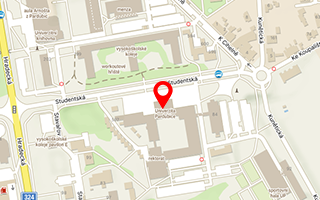SUSTAINABLE CITY: Challange Oriented Collaborative Online Communities
Provider: Evropská unie
Programme: ERASMUS+
Implementation period: 02.01.22 - 31.08.23
Workplace:
Team member: Bartošová Monika | Široký Jaromír | Nachtigall Petr | Křupka Jiří | Seidlová Andrea | Gottwald Dalibor | Chocholáč Jan | Matuška Jaroslav | Ledvinová Michaela | Vojtek Martin
Description:
The pandemic has forced various educational institutions to quickly adopt an online teaching format. From a technological point of view, this was not hard as there are now many different platorms available. However, a major challenge is the teaching methodology: learning online makes it more difficult to keep the student at the computer for a long time, as well as to involve the student in the lecture and help him/her avoid the distracton syndrome. Several months of quarantine, when teachers and students had to work in the format of distant learning, demonstrated that traditional methods are not optional, it is necessary to change the approach and help lecturers to overcome the challenges posed by online teaching. In the frames of the project, it is foreseen to create particular competencies oriented Content library, to train online community facilitators and then test the online community with students, by implementing some problem-based projects responding to the challenges in the field of Sustainable City. During the project partners will create Content Library of at least of 6 modules (e.g. Designing Environment-Friendly Spaces/Buildings, Transport Solutions, Waste Management, Urban Farming, Stress Reduction, Social Interaction, Physical Activity, etc.). Partners, based on their expertise and experience will offer the topic of the content they would like to create the most important the module must feed the concept of Sustainable City. In the first mee?ng, Consor?um will make a final decision on the topics to be developed. After developing Content Library, each project partner will run a community on an online platform (e.g. Facebook group) focused on the specific challenge, which corresponds the created module in the Content Library (e.g. Designing Environment-Friendly Leisure Space). Each community will have a few facilitators (they will be trained during the project) and students will be free to choose the challenge they would like to work on: so a student from Vilnius might wish to join Portuguese challenge, and the German student might wish to work in Polish established community. It could happen, we would have both national and international student teams; however, it would be preferable to encourage students to work on a challenge in international group.
The pandemic has forced various educational institutions to quickly adopt an online teaching format. From a technological point of view, this was not hard as there are now many different platorms available. However, a major challenge is the teaching methodology: learning online makes it more difficult to keep the student at the computer for a long time, as well as to involve the student in the lecture and help him/her avoid the distracton syndrome. Several months of quarantine, when teachers and students had to work in the format of distant learning, demonstrated that traditional methods are not optional, it is necessary to change the approach and help lecturers to overcome the challenges posed by online teaching. In the frames of the project, it is foreseen to create particular competencies oriented Content library, to train online community facilitators and then test the online community with students, by implementing some problem-based projects responding to the challenges in the field of Sustainable City. During the project partners will create Content Library of at least of 6 modules (e.g. Designing Environment-Friendly Spaces/Buildings, Transport Solutions, Waste Management, Urban Farming, Stress Reduction, Social Interaction, Physical Activity, etc.). Partners, based on their expertise and experience will offer the topic of the content they would like to create the most important the module must feed the concept of Sustainable City. In the first mee?ng, Consor?um will make a final decision on the topics to be developed. After developing Content Library, each project partner will run a community on an online platform (e.g. Facebook group) focused on the specific challenge, which corresponds the created module in the Content Library (e.g. Designing Environment-Friendly Leisure Space). Each community will have a few facilitators (they will be trained during the project) and students will be free to choose the challenge they would like to work on: so a student from Vilnius might wish to join Portuguese challenge, and the German student might wish to work in Polish established community. It could happen, we would have both national and international student teams; however, it would be preferable to encourage students to work on a challenge in international group.
